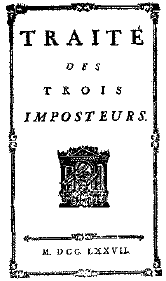Clandestine literature
From The Art and Popular Culture Encyclopedia
|
"I know of no bomb other than a book" --Stéphane Mallarmé "The book which most deserved to be banned would be a catalogue of banned books." --Georg Christoph Lichtenberg |

Illustration: Portrait fantaisiste du marquis de Sade (1866) by H. Biberstein
|
Related e |
|
Featured: |
Underground literature or clandestine literature refers to a type of editorial and publishing process that involves self-publishing works, often in contradiction with the legal standards of a location. Clandestine literature is often an attempt to circumvent censorship, prosecution, or other suppression. In academic study, such literature may be referred to as heterodox publications (as opposed to officially sanctioned, orthodox publishing).
Many of these books have attracted a cult following including banned books, transgressive fiction, controversial books and erotic literature. A near synonym would be cult fiction. The term "underground literature" first gained widespread attention with the publication of The Literary Underground of the Old Regime in 1982.
Examples
Examples of clandestine literature include the Samizdat literature of Soviet dissidents; the Aljamiado literature of Al-Andalus Spain; and the nushu writing of some upper-class women in Hunan, China, from around the 10th century to the 19th century. Clandestine publications were plentiful during the Enlightenment era in 18th-century France, circulating as pamphlets or manuscripts, usually containing texts that would have been considered highly blasphemous by the Ancien Régime, or even straight out atheist. These clandestine manuscripts particularly flourished in the 1720's, and contained such controversial works as Treatise of the Three Impostors and the reverend Jean Mesliers Atheistic Testament. Both texts were later published in edited versions by Voltaire, but handwritten manuscript copies have been found in private libraries all over Europe. The clandestine literature of 18th century France also consisted of printed works produced in neighbouring Switzerland or the Netherlands and smuggled into France. These books were usually termed "philosophical works", but varied greatly in content from pornography, utopian novels, political slander and actual philosophical works by radical enlightenment philosophers like Baron d'Holbach, Julien Offray de La Mettrie and Jean-Jacques Rousseau.
The willingness to break the law may be due to ideological reasons, when works are contrary to government positions or pose a threat to the institutions in power, but also for reasons at a formal level, when publications do not comply with legal regulations imposed for the circulation of printed works. Underground literature is a type of clandestine literature that does not necessarily have the evasion of the censorship of the time as its purpose; the goal of its writers may only be to lower publishing costs, often being funded by the authors themselves.
Works that are originally published by clandestine means may eventually become established as canonical literature, such as Das Kapital and El Buscón.
A legitimate publisher in one jurisdiction may assist writers from elsewhere to circumvent their own laws by enabling them to publish abroad. The Olympia Press in Paris published several 20th-century English-language writers, including Henry Miller, who were facing censorship and possible prosecution in their own country at the time.
Bibliography
- this list overlaps with obscenity#Bibliography
- De libris obscoenis (1688) is a book by Johann David Schreber and Adam Rechenberg
- "Explanation Concerning Obscenities" (1702) by Pierre Bayle
- Index Librorum Prohibitorum (1877) by Henry Spencer Ashbee
- "Obscene" Literature and Constitutional Law (1911) by Theodore Schroeder
- To the Pure (1928) by Morris Ernst, William Seagle
- "Pornography and Obscenity" (1929) by D. H. Lawrence
- The Banned Books of England and Other Countries (1962) by Alec Craig
- The End of Obscenity (1968) by American lawyer Charles Rembar
- Grub Street: Studies in a Subculture (1972) by Pat Rogers
- The Literary Underground of the Old Regime (1982) by Robert Darnton
- Rants and Incendiary Tracts (1989) by Bob Black and Adam Parfrey
- Radical Underworld (1993) by Iain McCalman
- The Forbidden Best-Sellers of Pre-Revolutionary France (1995) by Robert Darnton
- The Traffic in Obscenity from Byron to Beardsley (2006) by by Colette Colligan
See also
- Anonymity in publishing
- Alternative media
- Bestseller
- Censorship
- Grey literature
- Grub Street
- List of underground newspapers (by country and state)
- Literature
- News agency (alternative)
- UK Underground
- French resistance
- Polish underground press
- Samizdat
- Underground comix
- Underground culture
- Underground press
- Sade_biblio#Works_published_anonymously_and_clandestinely


